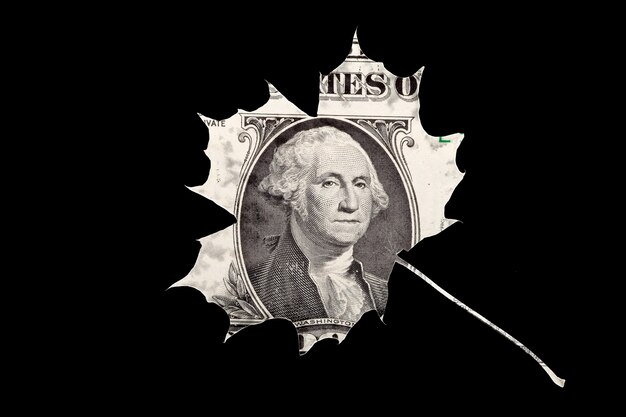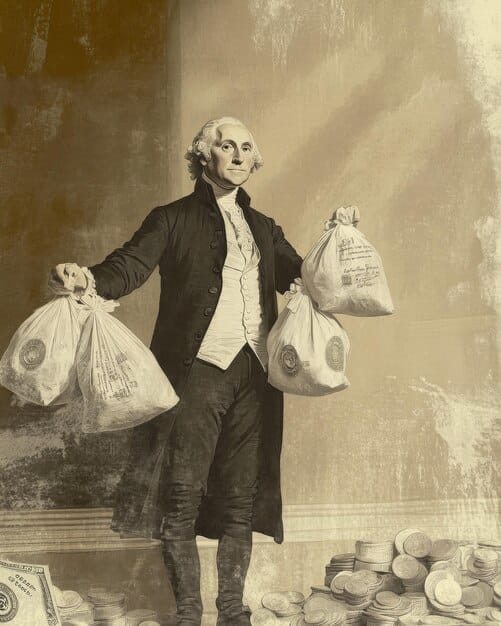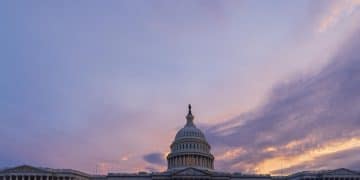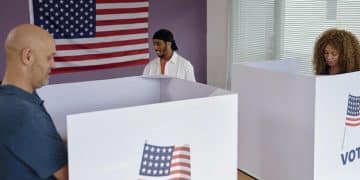Campaign Finance Loopholes: Fueling Political Corruption?

Campaign finance loopholes allow for unregulated money to influence political campaigns, potentially leading to corruption as wealthy donors gain undue influence over policy decisions.
Are campaign finance loopholes fueling a new wave of political corruption in the US? The current system allows vast sums of money to influence elections, raising concerns about fairness and transparency.
The Evolution of Campaign Finance Regulations
Campaign finance regulations in the United States have a long and complex history, evolving in response to various scandals and concerns about the influence of money in politics. Understanding this evolution is crucial to grasping the current debate surrounding loopholes.
Initially, campaign finance was largely unregulated, but growing concerns about wealthy individuals and corporations buying influence led to the passage of the Tillman Act in 1907. This act prohibited corporations and national banks from contributing money to federal campaigns.
Key milestones in campaign finance regulation:
- The Federal Corrupt Practices Act of 1925: Aimed to increase transparency by requiring disclosure of campaign contributions and expenditures, though enforcement was weak.
- The Federal Election Campaign Act (FECA) of 1971: Introduced stricter disclosure requirements, limited individual and political committee contributions, and established the Federal Election Commission (FEC) to enforce campaign finance laws.
- Buckley v. Valeo (1976): A Supreme Court case that significantly altered campaign finance law by ruling that while limits on contributions are constitutional, limits on expenditures violate free speech.
Despite these attempts at regulation, money continued to find its way into politics through various channels, setting the stage for the loopholes that exist today. The Bipartisan Campaign Reform Act (BCRA), also known as McCain-Feingold, was passed in 2002 to address some of these issues, but it too has been weakened by court decisions and the emergence of new loopholes.

Defining Campaign Finance Loopholes
What exactly constitutes a campaign finance loophole? This is a crucial question when analyzing the impact of these loopholes on political corruption. In essence, loopholes are legal or regulatory gaps that allow individuals and organizations to circumvent campaign finance laws.
These loopholes often arise as unintended consequences of legislation or through creative interpretations of the law. They allow money to flow into the political system in ways that are not transparent or subject to the same restrictions as direct contributions.
Common types of campaign finance loopholes:
- Soft Money: Money contributed to political parties for party-building activities, rather than directly to candidates. While BCRA attempted to restrict soft money, loopholes still exist at the state and local levels.
- 501(c)(4) Organizations: These “social welfare” organizations can engage in political activities as long as it is not their primary purpose, allowing them to spend unlimited amounts of money on campaigns without disclosing their donors.
- Super PACs: Independent expenditure committees that can raise unlimited sums of money from corporations, unions, and individuals to support or oppose political candidates. They are not allowed to coordinate directly with campaigns.
These loopholes exploit the boundaries of what is legally defined as a “contribution” or “expenditure,” allowing vast sums of money to influence campaigns without directly violating existing laws. The lack of transparency and accountability associated with these loopholes raises concerns about potential corruption.
The Role of Super PACs and 501(c)(4)s
Super PACs and 501(c)(4) organizations have become increasingly prominent in campaign finance, largely due to their ability to raise and spend unlimited amounts of money. Their rise has significantly altered the political landscape.
Super PACs, officially known as independent expenditure-only committees, emerged after the Supreme Court’s decision in *Citizens United v. FEC* (2010). This ruling held that corporations and unions have the same free speech rights as individuals, allowing them to spend unlimited amounts of money in support of or opposition to political candidates, as long as they do not coordinate directly with campaigns.
The impact of Super PACs:
- Increased Spending: Super PACs have injected unprecedented amounts of money into elections, amplifying the voices of wealthy donors and special interests.
- Negative Campaigning: Super PACs often engage in negative campaigning, running attack ads that can shape public opinion and influence election outcomes.
- Lack of Accountability: Because Super PACs are not directly tied to campaigns, they can make claims and engage in tactics that campaigns might avoid due to accountability concerns.
501(c)(4) organizations, on the other hand, are nonprofit organizations that can engage in political activity as long as it is not their primary purpose. They are not required to disclose their donors, making it difficult to track the source of their funding.
These organizations have been criticized for their lack of transparency and their potential to be used as conduits for undisclosed political spending. The combination of Super PACs and 501(c)(4)s has created a complex and opaque system of campaign finance that raises serious concerns about corruption.
The Citizens United Decision and Its Aftermath
The *Citizens United v. FEC* Supreme Court decision is a landmark ruling that dramatically reshaped campaign finance law in the United States. Its impact continues to be felt today.
In January 2010, the Supreme Court ruled that corporations and unions have the same First Amendment rights as individuals, and thus, the government cannot restrict their independent political spending in candidate elections. This decision effectively overturned decades of campaign finance law and paved the way for the rise of Super PACs and other independent expenditure groups.
The core arguments of the Citizens United decision:
- Freedom of Speech: The majority opinion argued that restricting corporate and union spending on political advertisements amounted to censorship and violated their free speech rights.
- Independent Expenditures: The Court distinguished between contributions to candidates, which can be limited, and independent expenditures, which cannot be restricted.
- Corporations as People: The Court treated corporations as individuals with constitutional rights, a concept that has been highly controversial.
The aftermath of *Citizens United* has been significant. Campaign spending has skyrocketed, and the influence of wealthy donors and special interests has grown. Critics argue that the decision has eroded the integrity of elections and made it more difficult for ordinary citizens to have their voices heard.
Proponents of the decision argue that it has enhanced free speech and allowed for a more robust debate on important issues. However, the overwhelming evidence suggests that the *Citizens United* decision has exacerbated the problem of campaign finance loopholes and fueled a new wave of political corruption.

The Potential for Political Corruption
The existence of campaign finance loopholes raises serious concerns about the potential for political corruption. When vast sums of unregulated money flow into the political system, it can create opportunities for quid pro quo arrangements and undue influence.
Corruption can take many forms, from direct bribery to more subtle forms of influence peddling. Wealthy donors and special interests may use their financial contributions to gain access to policymakers and shape legislation in their favor.
The various risks for political corruption:
- Quid Pro Quo: Donors may expect or receive specific favors in exchange for their contributions, creating a direct link between money and policy decisions.
- Access and Influence: Even without explicit quid pro quo, large donors often gain privileged access to policymakers, giving them a disproportionate influence over the legislative process.
- Erosion of Public Trust: The perception that money influences politics can erode public trust in government and undermine democratic institutions.
The lack of transparency and accountability associated with campaign finance loopholes makes it difficult to detect and prevent corruption. The current system allows for a “shadowy” flow of money that can undermine the integrity of elections and government.
Proposed Reforms and Solutions
Addressing the problem of campaign finance loopholes requires comprehensive reforms and solutions. Several proposals have been put forward to address the issue, but none have yet gained widespread support.
One approach is to strengthen campaign finance laws by closing existing loopholes and increasing transparency. This could include tightening regulations on Super PACs and 501(c)(4) organizations, requiring greater disclosure of donors, and limiting the amount of money that can be spent on campaigns.
What kind of reforms could be enacted?
- Constitutional Amendment: Some advocate for a constitutional amendment to overturn the *Citizens United* decision and clarify that corporations are not people with the same constitutional rights as individuals.
- Public Financing: Public financing of elections could reduce the influence of private money and level the playing field for candidates who lack access to wealthy donors.
- Strengthening Enforcement: Enhancing the enforcement powers of the FEC could help deter campaign finance violations and hold those who break the law accountable.
Another approach is to focus on empowering small donors and promoting grassroots activism. This could include establishing matching funds programs to amplify the impact of small contributions and encouraging citizen participation in the political process.
Ultimately, addressing the problem of campaign finance loopholes requires a multi-faceted approach that combines legal reforms, increased transparency, and grassroots activism. Strengthening democracy and restoring public trust will require political will and a commitment to fair and transparent elections.
| Key Point | Brief Description |
|---|---|
| 💰 Campaign Finance Loopholes | Legal gaps allowing unregulated money in politics. |
| ⚖️ Citizens United Decision | Supreme Court ruling enabling unlimited corporate spending. |
| 📢 Super PACs & 501(c)(4)s | Organizations spending unlimited sums with limited disclosure. |
| 🗳️ Proposed Reforms | Amending laws and public financing to reduce corruption risks. |
FAQ
▼
Campaign finance loopholes are legal gaps allowing unregulated money into political campaigns, bypassing restrictions on direct contributions. They undermine transparency and accountability in elections.
▼
Citizens United allowed unlimited corporate and union spending in elections, leading to the rise of Super PACs. This decision significantly increased the role of money in politics.
▼
A Super PAC is an independent political committee that can raise unlimited sums to support or oppose political candidates. They cannot directly coordinate with candidates’ campaigns.
▼
501(c)(4)s are controversial due to their ability to engage in political activities without disclosing their donors. This lack of transparency raises concerns about hidden influence.
▼
Solutions include amending the Constitution, public financing of elections, and strengthening the FEC’s enforcement powers. These reforms could reduce the influence of private money.
Conclusion
Campaign finance loopholes pose a significant threat to the integrity of US elections, enabling undisclosed funds to sway political decisions. Addressing this complexity demands comprehensive reform—from overturning Citizens United to boosting transparency—to fortify democracy against corruption and ensure a fair political landscape for all voices.





